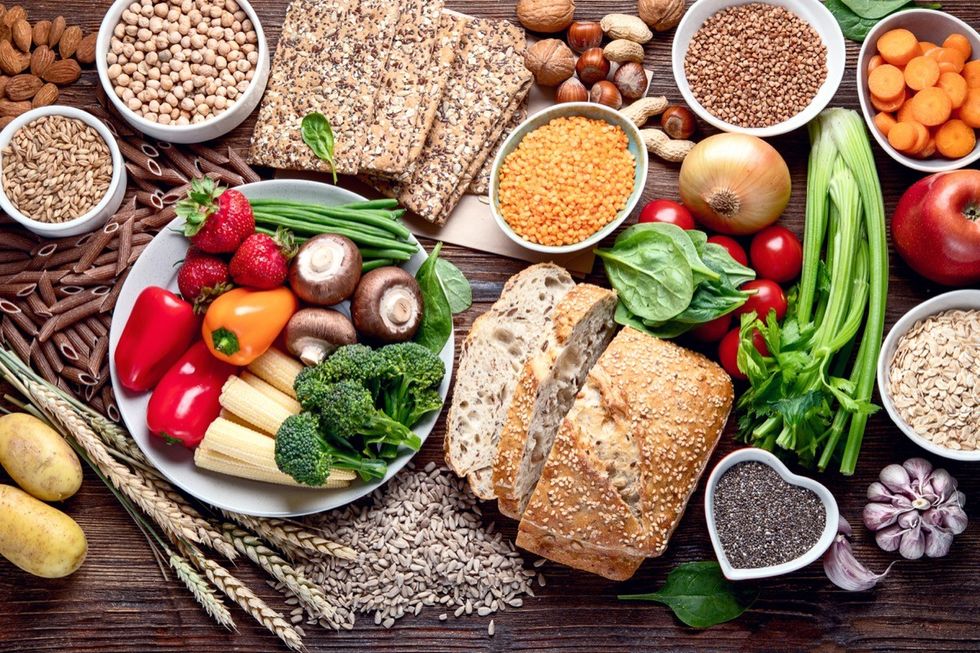
Isioma Evannie Patrick, famously known as Evanny Patrick, is a multi-talented Nigerian celebrity known for her acting skills, modeling career,…
Read More: Evanny Patrick Biography: Boyfriend, Age, Net Worth, Instagram, Photos, Movies, Wikipedia

Isioma Evannie Patrick, famously known as Evanny Patrick, is a multi-talented Nigerian celebrity known for her acting skills, modeling career,…
Read More: Evanny Patrick Biography: Boyfriend, Age, Net Worth, Instagram, Photos, Movies, Wikipedia

If you've ever tried to lose weight on your own, you know it can be a struggle. You have to be mindful of your calorie intake and expenditure, suppressing those pesky cravings while upping your daily exercise. But even when you feel like you're doing everything right, sometimes the scale just won't budge. While it's tempting to give up when you're not seeing progress, you might want to address other factors first, as there are many surprising reasons why people can't lose weight.
"Body weight is complex, and therefore can be challenging to manage," Karla Robinson, MD, medical editor at GoodRx, tells Best Life. "Weight management is determined by a lot of factors... To effectively lose weight, someone needs to build habits that address all of the factors that may be contributing to their excess weight. And this can be hard to do."
If you're curious about what's holding you back from achieving your goals, you're not alone. Read on to find out what nutritionists and doctors say are the most common reasons people struggle to lose weight.
RELATED: If You Want to Lose Weight, "Avoid These Foods Like the Plague," Fitness Expert Says.

If you've lost and regained weight often over the years—a process known as "weight cycling"—you might not see progress anymore, says registered dietitian Emily Van Eck.
"The more times one loses and gains back a significant amount of weight, the more at risk they are for cardiometabolic problems like insulin resistance, raised cholesterol, and loss of lean body mass, not to mention increased weight," she explains.
Karen Louise Scheuner, RDN, intuitive eating and body image coach, also points to yo-yo dieting and weight cycling.
"This decreases the metabolism with each subsequent diet, [and] the body becomes more efficient at storing fat for survival, as dieting is a threat to our system that will fight against starvation/famine," Scheuner notes. "This makes losing weight very challenging, if not impossible for some folks, particularly chronic dieters."
Moreover, a recent study found that fat cells may "remember" being obese, meaning that after someone has lost weight, they could gain it back more easily, as Best Life reported.

Sleep is integral to so many aspects of our well-being, weight loss not excluded.
"Although it can be challenging, getting at least seven to nine hours of quality sleep a night can positively impact your body’s metabolism and help regulate the hormones that let your body know you're hungry throughout the day," explains Robinson.
In addition, you could end up consuming more calories when you're not getting enough sleep.
"Insufficient sleep and interruptions in circadian rhythm may also predispose individuals to poor metabolic health, promoting weight gain," notes Nichole Dandrea-Russert, RDN, author of The Fiber Effect and nutritionist at Purely Planted. "Research shows that insufficient sleep can also increase caloric intake by 250 calories a day since sleep deprivation increases the desire to eat and may lead to unhealthy food choices."

Stress is another area that makes weight loss harder for some people, as it increases cortisol levels.
"Whether you’re worrying about losing weight or facing other types of stressful challenges, stress can increase cortisol levels," Dandrea-Russert explains.
"Cortisol, in the right amount, helps your body respond to danger, therefore it’s important. However, excessive cortisol can cause sleep disruptions, which is detrimental to metabolism and making wise food choices," explains Dandrea-Russert. "Cortisol can also lead to poor dietary choices and a feeling of hunger, even if you’re not truly hungry."
Melissa Pfeister, Stanford Medicine-certified nutritionist and founder of Stripped With Melissa, also points out that some people are "stress eaters," meaning they use food to cope with the stress in their lives.

Also on Dandrea-Russert's list of reasons you may struggle to lose weight? Your fiber intake, or the lack thereof.
"Over 95 percent of Americans don’t consume the recommended amount of fiber daily," she says. "Fiber prevents constipation and can assist with weight management because of its ability to fill you up quickly and keep you full longer. Fiber is also critical for gut health and helps produce short-chain fatty acids in the colon through feeding healthy bacteria in our gut."
In fact, a recent study found that higher fiber intake was associated with weight loss, Dandrea-Russert points out.

Like fiber, protein helps to keep you fuller for longer. It also helps to boost your metabolism.
"Your body burns more calories digesting protein than it does with carbs or fats—this is called the 'thermic effect,'" Elizabeth Katzman, FDN, a functional diagnostic nutrition practitioner, somatic coach, and founder of Strong Choices, previously shared with Best Life. "So, loading up on lean protein sources like chicken breast, fish, turkey, and beans can give your metabolism a slight edge."
Trista Best, RD, a registered dietitian with Balance One Supplements, says there's no one-size-fits-all answer for how much protein someone eat when trying to lose weight. "However, a common recommendation is to aim for 1.2 to 1.6 grams of protein per kilogram of body weight per day. This equals about 15 to 20 percent of your daily calorie intake," she points out.

With many diet programs, carbs are seen as the enemy. But Dandrea-Russert says that when it comes to weight loss, it's not about eliminating carbohydrates but understanding which foods provide healthy carbs.
For example, the simple carbs in a can of soda don't have a nutritional benefit and can spike your blood sugar. But the complex carbs in whole grains, fruit, and legumes "increase your blood sugar more slowly because they contain fiber and other complex starches that take longer for your body to digest," explains the Centers for Disease Control and Prevention (CDC).

We've all been there: You see an ad for a new weight-loss program that touts "amazing results." But these trendy diets can actually create bigger problems, especially if they force you to limit or be selective with your food groups (such as carbs).
"Anytime a diet forces you to eliminate certain foods (especially ones you like), micromanage everything you put in your mouth, or starve yourself, there’s a good chance you won’t be able to stick with it long-term," says Amy Killen, MD, a regenerative medicine physician and medical advisor at Joi Women’s Wellness. "For long-term dieting success, choose a healthy way of living that includes enough flexibility to see yourself adhering to the program for months or years, instead of days or weeks."

Think you'll save yourself some calories and speed up weight loss by skipping a meal or two here and there? Not so.
"Skipping meals can cause your body to go into a starvation mode, which slows down your metabolism, leading to weight gain rather than weight loss," explains Best. “Rather than skipping meals, consider eating mini-meals four or five times a day. This can keep your metabolism going without the need for the traditional large, time-consuming meals."

Unfortunately, not all weight-loss roadblocks are within our control.
"The older you get, the less muscle mass you carry on your body," Robinson says. "Lower muscle mass can cause your metabolism to slow down and retain fat."
She suggests incorporating more strength training to "build and retain muscle" to combat this.
Genetics could also play a role. "Inherited genetic traits include how the body stores fat, metabolic rates, and the capacity for exercise," Robinson explains. "You may also inherit an underlying disease that makes losing weight challenging."

Another weight-loss component that's out of your control is underlying illness, which can have more of an effect than you might realize.
"Some people have underlying diseases, like hypothyroidism and polycystic ovary syndrome (PCOS), that make it harder to lose weight," Robinson says. "Health conditions such as these can impact metabolic rates and hormone levels, which can make weight management difficult."
If you believe you may be suffering from one of these conditions, speak to your healthcare provider.

Biography Kashyap “Kash” Patel, born Kashyap Pramod Vinod Patel on February 25, 1980, in Garden City, New York, is a…
Read More: Kash Patel Biography: Wife, Age, Books, Net Worth, Education, Family, Children

Iván Cornejo is an American singer-songwriter who has become a prominent figure in the regional Mexican genre. Born in California…

Sora Simmons, also known as Sky Jade, has gained fame as a Japanese-American content creator on multiple platforms. He is…
Read More: Sky Jade Biography: Wiki, Height, Age, Net Worth, Parents, Girlfriend, Children, Tiktok